The Liverpool Slavery Walking Tour offers a unique glimpse into the city’s complex past, exploring the commercial aspects of its involvement in the transatlantic slave trade. Led by knowledgeable guides, participants uncover the stark realities behind Liverpool’s economic expansion and infrastructure development, discovering how profits from this exploitative industry fueled the region’s prosperity. As visitors journey through key historical locations, they’re prompted to reflect on the ethical implications of this harrowing chapter, gaining a deeper understanding of the lasting impact on the city and its people. The tour’s engaging narratives provide a thought-provoking exploration of this pivotal, yet controversial, era in Liverpool’s history.
Key Points
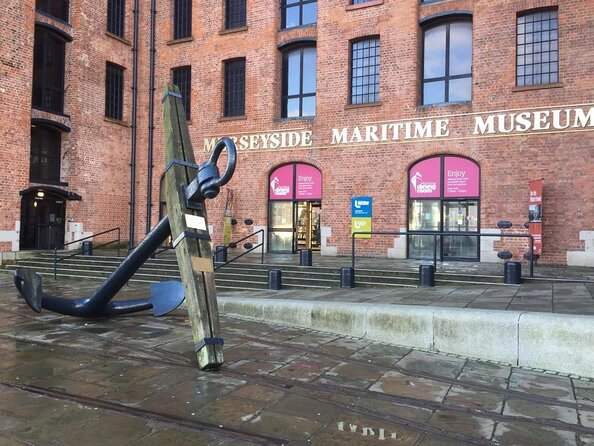
- The tour highlights Liverpool’s historical role as a major hub for the transatlantic slave trade, focusing on its commercial and economic impacts.
- Key locations visited include docks, warehouses, and buildings associated with the slave trade and its financial benefits to the city.
- Guides share stories linking the city’s past events to current landmarks and institutions, providing insights into the enduring impacts of this dark history.
- The tour emphasizes how profits from the slave trade fueled Liverpool’s rapid economic expansion, leading to the construction of grand buildings and development of global financial influence.
- Participants are encouraged to reflect on the complex moral legacy and ethical challenges associated with Liverpool’s prosperity being tied to human rights violations.
Tour Overview and Details
The Liverpool Slavery Walking Tour provides visitors with a comprehensive exploration of the city’s historical role in the slave trade, including its finance and shipping aspects.
Rated at 3.9 stars from 14 reviews, the tour starts at the iconic Royal Liver Building and ends at Custom House Place.
Led by knowledgeable guides Edward and Tommy Allen, the tour accommodates a maximum of 12 travelers and is accessible for wheelchair users and those with service animals.
Highlights include key locations related to the slave trade, notable Liverpool buildings, and cultural references.
Visitors can expect an educational and engaging experience that offers insights into the city’s trade history and its significant impact on the global slave trade.
If you're enjoying exploring Liverpool on foot, you'll love these other walking tours we recommend
Inclusions and Booking Information
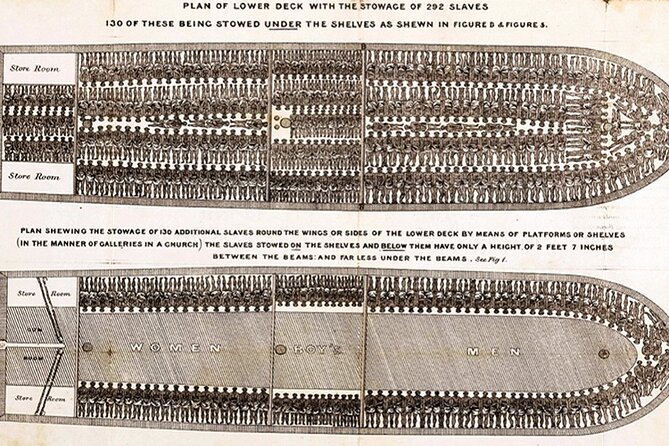
Visitors to the Liverpool Slavery Walking Tour can expect a range of inclusions, from all fees and taxes to snacks and gratuities, providing a comprehensive experience.
Booking the tour is straightforward, with confirmation received at the time of reservation and the option for free cancellation up to 24 hours prior to the start. This ‘reserve now, pay later’ feature allows travelers to secure their spot without an immediate financial commitment.
The tour’s accessibility, accommodating wheelchair users, strollers, and service animals, further enhances its inclusivity.
Tour Experience
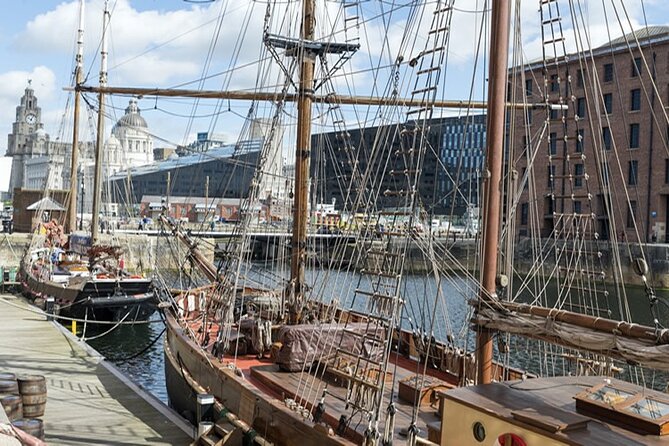
Focusing on Liverpool’s historical role in the slave trade, the walking tour highlights key locations, notable buildings, and cultural references that underscore the city’s complex trade history and its significant impact on the transatlantic slave economy. The tour takes participants through the city’s streets, providing insights into Liverpool’s transformation from a small fishing village to a major maritime and financial hub fueled by the business of slavery. Along the way, the guides share stories that bring the city’s past to life, from the docks where slave ships once docked to the grand buildings that housed the banking and insurance institutions that financed the trade.
| Highlight | Description |
|---|---|
| Key Locations | Docks, warehouses, and buildings associated with the slave trade |
| Noteworthy Buildings | Royal Liver Building, Custom House, and other architectural landmarks |
| Cultural References | Connections to figures like Paul McCartney’s father and the city’s musical legacy |
Tour Guides and Reviews
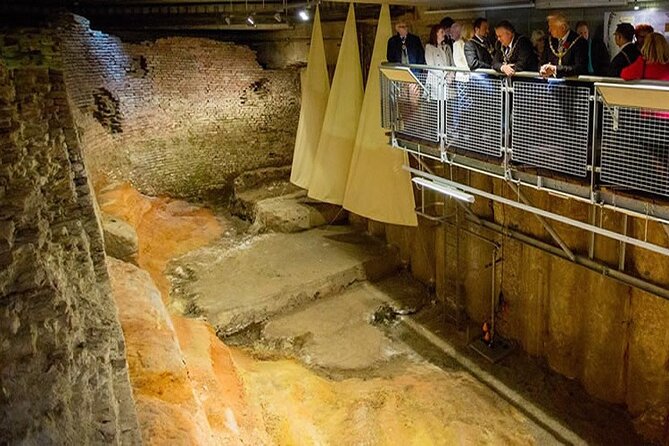
Guiding the Liverpool Slavery Walking Tour are Edward and Tommy Allen, whose knowledge and engaging presentation style have earned them praise from participants.
The two brothers are noted for their ability to bring Liverpool’s complex trade history to life, offering insights that go beyond typical historical facts.
Reviewers highlight the guides’ flexibility in tailoring the tour to participants’ interests and their willingness to answer questions.
Using historical photographs and other visual aids, Edward and Tommy skillfully weave together the story of Liverpool’s central role in the transatlantic slave trade, providing an educational and thought-provoking experience for all who join the tour.
Visitor Feedback
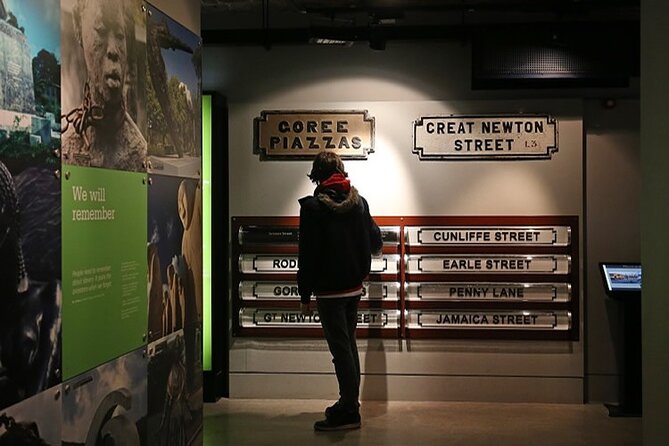
The reviews for the Liverpool Slavery Walking Tour speak to the positive sentiment among participants, with many emphasizing the educational aspects and unique insights into the city’s history.
Visitors consistently praised the tour for its ability to shed light on Liverpool’s often-overlooked role in the slave trade and its wider economic impact.
Highlights from reviewer feedback include:
-
‘A real lesson in history – I’d no idea Liverpool played such a central part.’
-
‘A great way to see the city through a different lens and discover details I’d never noticed before.’
-
‘Fascinating and informative – the guides were incredibly knowledgeable and flexible in answering our questions.’
-
‘Excellent tour that brought the past to life in a compelling way.’
-
‘As a long-term resident, I appreciated learning new aspects of my city’s history.’
- A Walk Through Time: History of Liverpool Walking Tour
- The Ultimate Beatles Tour Experience in Liverpool.
- Ciy Explorer: Hop On Hop Off Liverpool Sightseeing Bus Tour
- Liverpool: River Cruise & Sightseeing Bus Tour
- Half-Day Peaky Blinders Tour of Liverpool
- BEST OF LIVERPOOL-Heritage, History & Culture Guided Walking Tour
Historical Context
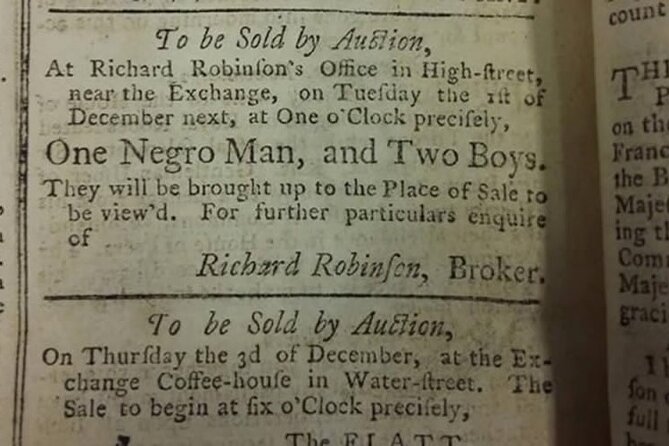
Liverpool’s role in the transatlantic slave trade was deeply entangled with its rise as a major commercial center during the 18th and 19th centuries.
As a hub for maritime trade, Liverpool’s merchants, shipbuilders, and financiers profited immensely from the lucrative but inhumane slave trade. The city’s port facilities, insurance firms, and banking sector all thrived on this horrific industry.
Many of Liverpool’s grand buildings and landmarks were constructed with wealth derived from the slave trade. This dark history is a crucial part of the city’s past, shaping its economic development and international reputation.
Understanding this context is essential for appreciating the significance of the Liverpool Slavery Walking Tour and its efforts to confront this complex legacy.
Economic Impacts
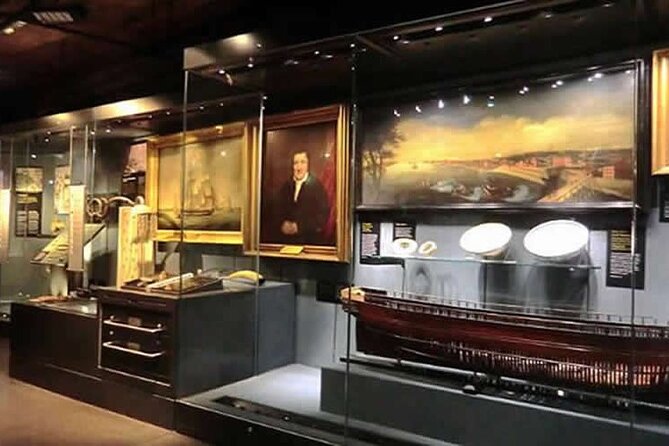
Through the Liverpool Slavery Walking Tour, visitors gain insight into how the city’s deep involvement in the transatlantic slave trade fueled its rapid economic expansion over centuries.
Liverpool’s merchants, shipbuilders, and financiers amassed immense wealth from this inhumane industry, which then financed the construction of the city’s grand buildings and landmarks. This dark legacy underscores the intricate connections between Liverpool’s prosperity and the egregious human rights abuses that enabled it.
Some of the key economic impacts highlighted on the tour include:
-
The lucrative trade in human cargo that generated massive profits for Liverpool’s elites.
-
The growth of the city’s shipbuilding and maritime industries to support the slave trade.
-
The investment of slave trade profits in Liverpool’s infrastructure and real estate development.
-
The city’s emergence as a global financial hub for the financing of the slave trade.
-
The enduring wealth and influence of families that built their fortunes on the backs of enslaved people.
Ethical Considerations

As visitors embark on the Liverpool Slavery Walking Tour, they confront the city’s complex moral legacy – one deeply entangled with the egregious human rights violations of the transatlantic slave trade.
While Liverpool’s economic prosperity was inextricably linked to its role as a major port and center of the slave trade, the ethical implications of this history are undeniable.
The tour prompts critical reflections on the human costs of this trade, the complicity of institutions and individuals, and the enduring impacts on enslaved populations and their descendants.
As participants grapple with this fraught past, the tour encourages a nuanced understanding of Liverpool’s history and its lasting ethical challenges.
Frequently Asked Questions
Is Audio Commentary Available During the Tour?
The tour does not mention any audio commentary being provided. The details indicate the experience is led by knowledgeable guides who provide live commentary and insights during the walking tour.
Can We Take Photographs During the Tour?
Yes, visitors can generally take photographs during the tour. The tour guides encourage participants to capture memorable moments and sites along the way, providing an opportunity to visually document the experience.
Are There Opportunities to Stop for Restrooms or Refreshments?
The tour includes breaks for restroom stops and refreshments. Guides typically provide opportunities to purchase snacks and drinks during the tour, allowing participants to rest and recharge as they explore the historical sites.
Can I Purchase Souvenirs Related to the Tour?
The tour does not appear to include the opportunity to purchase souvenirs related to the historical content. However, visitors can likely find relevant books, maps, or other items at local shops near the tour’s start and end points.
Are There Any Age Restrictions or Requirements for the Tour?
The walking tour has no age restrictions, but children must be accompanied by an adult. The experience is accessible to all ages, though it may cover sensitive historical topics that some younger visitors may find challenging.
Recap
The Liverpool Slavery Walking Tour provides a thought-provoking exploration of the city’s historical involvement in the transatlantic slave trade.
Participants gain insights into how the profits from this exploitation fueled Liverpool’s economic expansion, while also confronting the ethical implications of this legacy.
The tour encourages reflection on the complex and troubling history that underpins the city’s prosperity, prompting visitors to consider the ongoing impact and importance of acknowledging this difficult past.
More Walking Tours in Liverpool
- Private Liverpool Walking Tour With Local Guide
- Liverpool Heritage, History, Culture Walking Tour-Shore Excursion
- Liverpool Maritime History – 2 Hour Walking Tour for 1-15 People
- Welcome to Liverpool: Private 2-hour Walking Tour
- The Story of Liverpool 2-Hour Walking Tour
- Evening Walking Historical Pub Crawl in Liverpool
More Tours in Liverpool
- Liverpool’s Hidden Histories: A Self-Guided Walking Tour
- Shore Excursion: Chester Experience- 1/2 Day Tour From Liverpool
- Liverpool Tour App, Hidden Gems Game and Big Britain Quiz (1 Day Pass) UK
- The Liverpool Pass: All Top Attractions Inc. Hop-On Hop-Off Bus Tour 1-Day
- Ultimate Beatles Ticket To Ride Half-Day PRIVATE Tour
- Liverpool True Crime Tour
More Tour Reviews in Liverpool
Not for you? Here's more things to do in Liverpool we have recnetly reviewed
- 2 Best Shopping Tours In Liverpool
- 11 Best Cruises And Boat Tours In Liverpool
- 6 Best Food Tours In Liverpool
- Half Day Welcome to Liverpool Walking Tour
- Liverpool City Scavenger Hunt Excursion by Zombie Scavengers
- Full Day Private Shore Tour in Liverpool From Liverpool Port
- Liverpool Airport (LPL) to Liverpool Cruise Port – Arrival Private Transfer
- Liverpool Cheese Crawl @ 12pm
- See Liverpool With A Local: Private & Personalized
- Liverpool: Look A Local Host Half Day
- Small-Group St. James Cemetery Tour in Liverpool
- Private Transfer From Bootle to Manchester Airport (Man)
